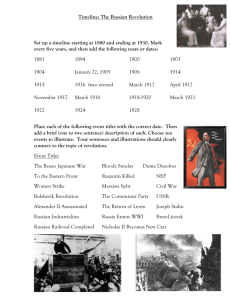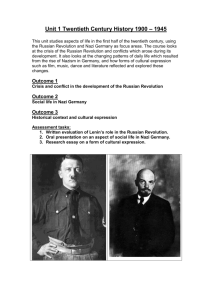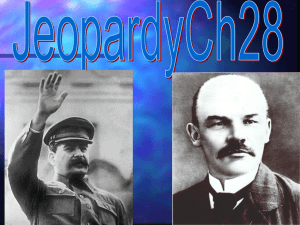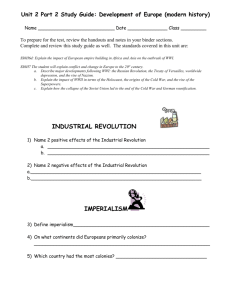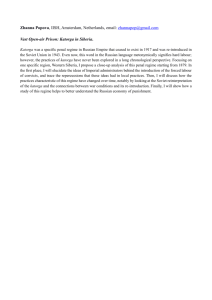The Russian Revolution The Russian Revolution of
advertisement
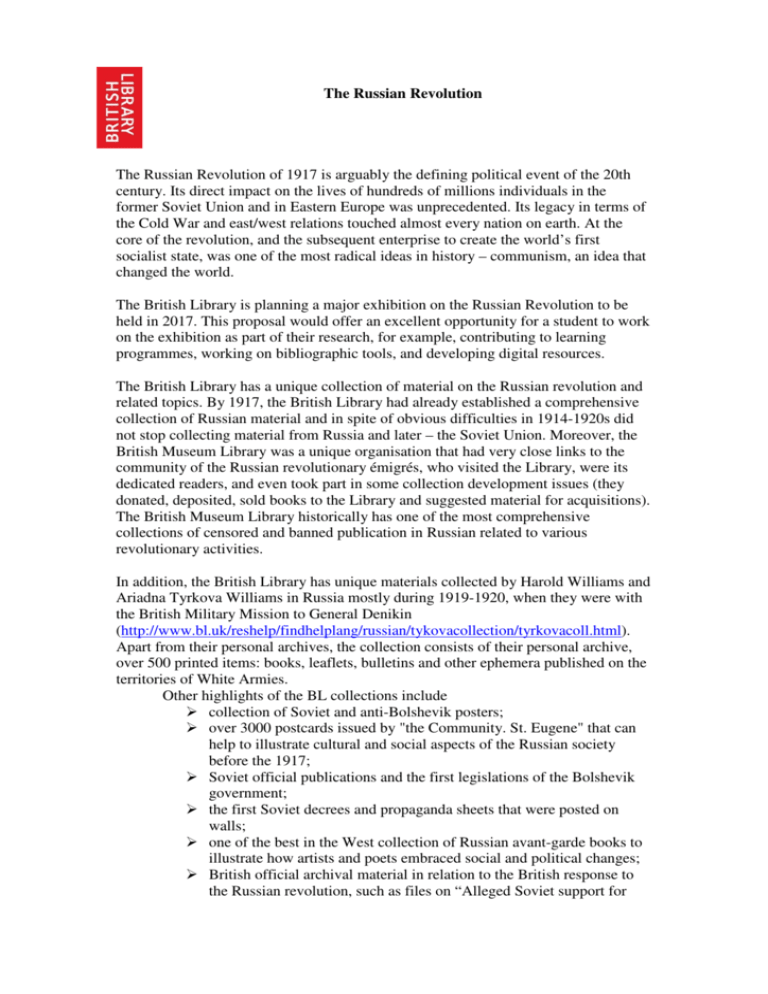
The Russian Revolution The Russian Revolution of 1917 is arguably the defining political event of the 20th century. Its direct impact on the lives of hundreds of millions individuals in the former Soviet Union and in Eastern Europe was unprecedented. Its legacy in terms of the Cold War and east/west relations touched almost every nation on earth. At the core of the revolution, and the subsequent enterprise to create the world’s first socialist state, was one of the most radical ideas in history – communism, an idea that changed the world. The British Library is planning a major exhibition on the Russian Revolution to be held in 2017. This proposal would offer an excellent opportunity for a student to work on the exhibition as part of their research, for example, contributing to learning programmes, working on bibliographic tools, and developing digital resources. The British Library has a unique collection of material on the Russian revolution and related topics. By 1917, the British Library had already established a comprehensive collection of Russian material and in spite of obvious difficulties in 1914-1920s did not stop collecting material from Russia and later – the Soviet Union. Moreover, the British Museum Library was a unique organisation that had very close links to the community of the Russian revolutionary émigrés, who visited the Library, were its dedicated readers, and even took part in some collection development issues (they donated, deposited, sold books to the Library and suggested material for acquisitions). The British Museum Library historically has one of the most comprehensive collections of censored and banned publication in Russian related to various revolutionary activities. In addition, the British Library has unique materials collected by Harold Williams and Ariadna Tyrkova Williams in Russia mostly during 1919-1920, when they were with the British Military Mission to General Denikin (http://www.bl.uk/reshelp/findhelplang/russian/tykovacollection/tyrkovacoll.html). Apart from their personal archives, the collection consists of their personal archive, over 500 printed items: books, leaflets, bulletins and other ephemera published on the territories of White Armies. Other highlights of the BL collections include collection of Soviet and anti-Bolshevik posters; over 3000 postcards issued by "the Community. St. Eugene" that can help to illustrate cultural and social aspects of the Russian society before the 1917; Soviet official publications and the first legislations of the Bolshevik government; the first Soviet decrees and propaganda sheets that were posted on walls; one of the best in the West collection of Russian avant-garde books to illustrate how artists and poets embraced social and political changes; British official archival material in relation to the British response to the Russian revolution, such as files on “Alleged Soviet support for Bolshevik activities; Parliamentary questions” and “Alleged purchase of arms from Austro-Hungary, 1922-27”; eyewitness accounts of British and American journalists who were working in Russia in 1914-1918 published immediately on their return; audio recordings of Lenin and Stalin; recordings of interviews with members of the Communist party of Great Britain and prominent slavists; recordings of Russian musicians and composers; rare émigré publications of the so called “first wave” of Russians who had to flee the country because of the Revolution; rare British newspapers and other periodicals where influential British journalists (Luboff, Wesselitzsky, etc.) of the Russian origin published their views on the situation in Soviet Russia trying to win the general public and influence British politicians; Russian and British maps of Russia, the Russian Empire and the Soviet Union that can illustrate various aspects of social and economic life of the tsarist Russia and the Soviet Union, etc. Possible themes: Women in revolution Journalism The Tyrkova-Williams archive British foreign policy and official response to the revolution The Civil War and White armies
